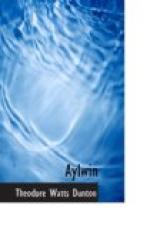However, my punishment came at last. The coast, which is yielding gradually to the sea, is famous for sudden and gigantic landslips. These landslips are sometimes followed, at the return of the tide, by a further fall, called a ‘settlement.’ The word ‘settlement’ explains itself, perhaps. No matter how smooth the sea, the return of the tide seems on that coast to have a strange magnetic power upon the land, and the debris of a landslip will sometimes, though not always, respond to it by again falling and settling into new and permanent shapes.
Now, on the morning after a great landslip, when the coastguard, returning on his beat, found a cove where, half-an-hour before, he had left his own cabbages growing, I, in spite of all warnings, had climbed the heap of debris from the sands, and while I was hallooing triumphantly to two companions below—the two most impudent-looking urchins, bare-footed and unkempt, that ever a gentleman’s son forgathered with—a great mass of loose earth settled, carrying me with it in its fall. I was taken up for dead.
It was, however, only a matter of broken ribs and a damaged leg. And there is no doubt that if the local surgeon had not been allowed to have his own way, I should soon have been cured. As it was I became a cripple. The great central fact—the very pivot upon which all the wheels of my life have since been turning—is that for two years during the impressionable period of childhood I walked with crutches.
It must not be supposed that my tears—the tears which at this moment were blotting out the light and glory of the North Sea in the sun—came from the pain I was suffering. They came from certain terrible news, which even my brother Frank had been careful to keep from me, but which had fallen from the lips of my father—the news that I was not unlikely to be a cripple for life. From that moment I had become a changed being, solitary and sometimes morose. I would come and sit staring at the ocean, meditating on tilings in general, but chiefly on things connected with cripples, asking myself, as now, whether life would be bearable on crutches.
At my heart were misery and anger and such revolt as is, I hope, rarely found in the heart of a child. I had sat down outside the rails at this most dangerous point along the cliff, wondering whether or not it would crumble beneath me. For this lameness coming to me, who had been so active, who had been, indeed, the little athlete and pugilist of the sands, seemed to have isolated me from my fellow-creatures to a degree that is inconceivable to me now. A stubborn will and masterful pride made me refuse to accept a disaster such as many a nobler soul than mine has, I am conscious, borne with patience. My nature became soured by asking in vain for sympathy at home; my loneliness drove me—silent, haughty, and aggressive—to haunt the churchyard, and sit at the edge of the cliff, gazing wistfully at the sea and the sands which could not be reached on crutches. Like a wounded sea-gull, I retired and took my trouble alone.




